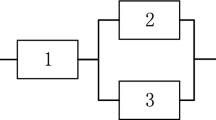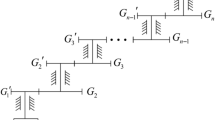Abstract
In this paper, a functionality unit named as meta-action unit (MAU) is proposed to correlate the system function with the part actions and assess reliability of mechanical system. Firstly, the function of system is decomposed into multiple MAUs by function-movement-action (FMA). Then, the lifetime of MAU is fitted by Weibull distribution, and its parameters are estimated by support vector regression (SVR). In addition, taking the distributions of MAU as marginal distributions, the lifetime distribution of mechanical system is constructed by copula function to assess system reliability, and its parameters are estimated using the maximum likelihood estimator (MLE). Further, the reliability assessment accuracy based on MAU is compared with that from traditional method based on mechanical part failure modes. Finally, the reliability assessment of the indexing turntable (IT) is performed as an example to illustrate the feasibility and reasonability of the proposed method.
Similar content being viewed by others
Abbreviations
- FMA :
-
Function-movement-action
- IT :
-
Indexing turntable
- LSE :
-
Least square estimation
- MA :
-
Meat action
- MAC :
-
Meat action chain
- MAU :
-
Meat action unit
- MLE :
-
Maximum likelihood estimator
- RMSE :
-
Root mean squared error
- SER :
-
System empirical reliability
- SVR :
-
Supporting vector regression
- WPP :
-
Weibull probability paper
References
J. F. Lawless, Statistical Models and Methods for Lifetime Data, 2nd Ed., John Wiley & Sons, Inc., Hoboken (2011).
X. Jia, Reliability analysis for q-Weibull distribution with multiply type-I censored data, Qual. Reliab. Eng. Int., 37(6) (2021) 2790–2817.
A. E. A. Ahmad and M. G. M. Ghazal, Exponentiated additive Weibull distribution, Reliab. Eng. Syst. Safe., 193 (2020) 106663.
T. T. Tien and R. Bris, An additive Chen-Weibull distribution and its applications in reliability modeling, Qual. Reliab. Eng. Int., 37(1) (2021) 352–373.
X. Huo, S. K. Khosa, Z. Ahmad, Z. Almaspoor, M. Ilyas and M. Aamir, A new lifetime exponential-x family of distributions with applications to reliability data, Math. Probl. Eng., 2020 (2020) 1316345.
A. Alkaff, M. N. Qomarudin and Y. Bilfaqih, Network reliability analysis: matrix-exponential approach, Reliab. Eng. Syst. Safe., 204 (2020) 107192.
X. Wen, Z. Wang, H. Fu, Q. Wu and C. Liu, BLUEs and reliability analysis for general censored data subject to inverse gaussian distribution, IEEE T. Reliab., 68(4) (2019) 1257–1271.
M. K. Shakhatreh, A. J. Lemonte and G. Moreno Arenas, The log-normal modified Weibull distribution and its reliability implications, Reliab. Eng. Syst. Safe., 188 (2019) 6–22.
A. Mathew and K. R. Deepa, Stress-strength reliability: a quantile approach, Statistics, 56(1) (2022) 206–221.
E. Farukkececi, Mechanical failure modes, Mechatronic Components, Elsevier Inc. (2019) 15–27.
L. Wang, K. Wu, Y. M. Tripathi and C. Lodhi, Reliability analysis of multicomponent stress-strength reliability from a bathtub-shaped distribution, J. Appl. Stat., 49(1) (2022) 122–142.
J. Xu, D. Yu, Q. Hu and M. Xie, A reliability assessment approach for systems with heterogeneous component information, Qual. Eng., 30(4) (2018) 676–686.
A. Alkaff, Discrete time dynamic reliability modeling for systems with multistate components, Reliab. Eng. Syst. Safe., 209 (2021) 107462.
Y. K. Son, Reliability prediction of engineering systems with competing failure modes due to component degradation, Journal of Mechanical Science and Technology, 25(7) (2011) 1717–1725.
C. Park, N. H. Kim and R. T. Haftka, The effect of ignoring dependence between failure modes on evaluating system reliability, Struct. Multidiscip. O., 52(2) (2015) 251–268.
L. Bian, G. Wang and P. Liu, Reliability analysis for multi-component systems with interdependent competing failure processes, Appl. Math. Model., 94 (2021) 446–459.
Y. Gu, C. Fan, L. Liang and J. Zhang, Reliability calculation method based on the copula function for mechanical systems with dependent failure, Ann. Oper. Res., 311 (2019) 99–116.
X. Jia, L. Wang and C. Wei, Reliability research of dependent failure systems using copula, Communications in Statistics — Simulation and Computation, 43(8) (2014) 1838–1851.
M. Xu, J. W. Herrmann and E. L. Droguett, Modeling dependent series systems with q-Weibull distribution and Clayton copula, Appl. Math. Model., 94 (2021) 117–138.
Y. Sun, L. Luo and Q. Zhang, Reliability analysis of stochastic structure with multi-failure modes based on mixed copula, Eng. Fail. Anal., 105 (2019) 930–944.
D. Li, G. Zhang, M. Li, J. Lou and H. Zhao, Assembly reliability modeling technology based on meta-action, Procedia CIRP, 27 (2015) 207–215.
X. Li, Y. Ran and F. Wan, Condition-based maintenance strategy optimization of meta-action unit considering imperfect preventive maintenance based on wiener process, Flex. Serv. Manuf. J., 34 (2022) 204–233.
Y. Li, C. Wu, X. Zhang, Y. Ran and G. Zhang, Early failure mechanism research of electromechanical product based on meta-action, Eng. Fail. Anal., 122(16) (2021) 105217.
Y. Li, G. Zhang, Y. Wang, X. Zhang and Y. Ran, Research on reliability allocation technology for NC machine tool meta-action, Qual. Reliab. Eng. Int., 35(6) (2019) 2016–2044.
H. Yu, G. Zhang, Y. Ran, M. Li, D. Jiang and Y. Chen, A reliability allocation method for mechanical product based on meta-action, IEEE T. Reliab., 69(1) (2020) 373–381.
R. Yan, Z. Genbao and Z. Lian, Quality characteristic association analysis of computer numerical control machine tool based on meta-action assembly unit, Advances in Mechanical Engineering, 8(1) (2016) 1–10.
X. Zhang, G. Zhang, Y. Li, Y. Ran, H. Wang and X. Gong, A novel fault diagnosis approach of a mechanical system based on meta-action unit, Advances in Mechanical Engineering, 11(2) (2019) 1–12.
W. R. Blischke and D. N. P. Murthy, Reliability: Modeling, Prediction, and Optimization, John Wiley & Sons, New York (2000).
H. Yu, G. Zhang and Y. Ran, A more reasonable definition of failure mode for mechanical systems using meta-action, IEEE Access, 7 (2019) 4898–4904.
Y. Li, X. Zhang, Y. Ran, W. Zhang and G. Zhang, Reliability and modal analysis of key meta-action unit for CNC machine tool, IEEE Access, 7 (2019) 23640–23655.
Y. Li, X. Zhang, Y. Ran, G. Zhang and Y. Wang, Research on meta-action decomposition and meta-action unit modeling technology for electromechanical product, Qual. Reliab. Eng. Int., 36(1) (2020) 268–284.
D. Ling, H. Huang and Q. Miao, Parameter estimation for Weibull distribution using support vector regression, International Design Engineering Technical Conferences/Computers and Information in Engineering Conference (2008) 445–449.
Acknowledgments
This work was supported in part by the National Natural Science Foundation of China under Grant 51835001, 52275473. The authors gratefully acknowledge the contribution and support of Ning Jiang Machine Tool Co., Ltd. (Sichuan, China), who provides the failure data of the mechanical product.
Author information
Authors and Affiliations
Corresponding author
Additional information
Xiao Zhu received the M.S. degree in Mechanical Engineering from Chongqing University, Chongqing, China, in 2019. His research interests include mechatronic product reliability assessment and maintainability analysis.
Yan Ran received the M.S. and Ph.D. degree in Mechanical Engineering from Chongqing University, Chongqing, China, in 2012 and 2016, respectively. She is currently an Associate Professor at Chongqing University, a fixed researcher at the State Key Laboratory of Mechanical Transmission, Chongqing University, a member of the Chongqing Science and Technology Association and a member of the National Association of Basic Research on Interchangeability and Measurement Technology. Her research interests include mechatronic product reliability technology and modern quality engineering.
Rights and permissions
About this article
Cite this article
Zhu, X., Ran, Y. & Li, X. Reliability assessment method based on the meta-action unit for complex mechanical system. J Mech Sci Technol 37, 1233–1242 (2023). https://doi.org/10.1007/s12206-023-0210-6
Received:
Revised:
Accepted:
Published:
Issue Date:
DOI: https://doi.org/10.1007/s12206-023-0210-6




